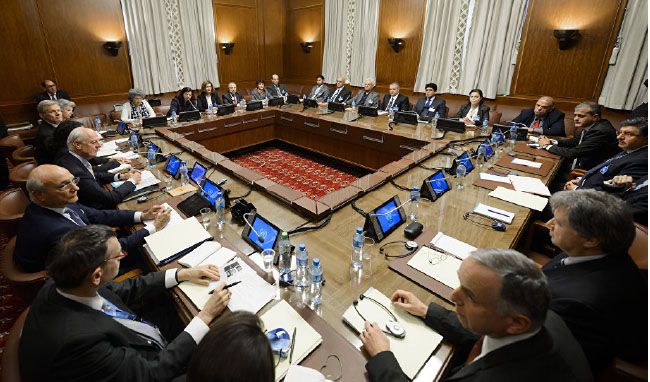Terrorism fills the air with a strong sense of fear. Life has turned cheap everywhere. Bloodcurdling incidents trigger an outpouring of grief and disappointment. Women and children, who are the most susceptible part of societies, pay high sacrifices in terrorist attacks. The scourge of war and violence blackmail the entire globe and inflict indescribable harms upon the war-torn countries such as Syria, Iraq, Afghanistan and Pakistan. Radicalism gave birth to the self-styled caliphate in Iraq which spews forth its venom nationwide. This organized guerilla group has played highly destructive role since its establishment and from the declaration of the caliphate, on June 2014, until early 2016, some 90 terrorist attacks were either carried out or inspired by ISIL in 21 countries around the globe.
The ISIL group is largely involved in militancy in Iraq and Syria. Nevertheless, it seems to lose ground in the battle against Iraqi government and Iraqi forces have entered a neighborhood in the western part of Mosul for the first time since the launch of an offensive to retake the city from ISIL last year. The operation to retake Iraq’s second-largest city was officially launched in October last year, and in January its eastern half was declared “fully liberated”. Mosul is ISIL’s last major urban stronghold in Iraq, but the battle to retake its western half is expected to be the most challenging yet, since the streets are older, narrower and is densely populated with an estimated 750,000 civilians trapped in the area.
In an incident, two suicide car bombers reportedly struck army and paramilitary forces west of Mosul on Monday, killing and wounding a number of troops with ISIL claiming responsibility for the attacks.
Similarly, a series of suicide attacks on military installations in Syria’s government-held city of Homs have killed at least 32 people, including the army’s intelligence chief General Hassan Daabul - a close confidante of President Bashar al-Assad and critically wounded Brigadier Ibrahim Darwish, head of the State Security Branch.
The rebel alliance known as Tahrir al-Sham is believed to have carried out the attack. It was formed earlier this year from several groups including Jabhat Fateh al-Sham, formerly known as al-Nusra Front, which was al-Qaeda’s Syrian branch until it broke formal allegiance in 2016. Since it was formed, Tahrir al-Sham has fought other rebel groups, including some that fight under the banner of the Free Syrian Army, as well as a faction linked to ISIL group, in northwest Syria.
The attack came as peace negotiators held talks for the second day in Geneva over Syria’s six-year-old civil war that has killed nearly 500,000 people, wounded more than a million, and displaced nearly half the population. Like its rival ISIL, Jabhat Fateh al-Sham is not party to a ceasefire between government forces and opposition groups taking part in the Geneva talks. The Syrian opposition has described the fourth round Geneva meeting “generally positive”. “We heard positive ideas and suggestions from Mr. de Mistura,” Nasser al-Hariri, the lead opposition negotiator is cited as saying. Hariri added the opposition presented its “understanding” of points in UN Security Council Resolution 2254 that discuss political transition in Syria, including governance, the formation of a new constitution and new UN-supervised elections.
The opposition’s participation in the latest round of Geneva talks was aimed at finding ways to implement “mechanisms” to “force the Syrian government to comply with UN Security Council resolutions surrounding Syria, if it refuses to do so”.
Though the Geneva talks are seen as the most serious effort in months to put an end to the Syrian war, the starkly different political objectives of the rival sides remain unchanged from previous rounds of negotiations, casting doubt on the possibility of achieving progress. For the Syrian opposition, a political transition that ensures the removal of President Bashar al-Assad remains the only option for peace – an issue that his Damascus-based government has consistently refused to consider. “The only solution that we will accept is to establish a transitional governing body, which Bashar al-Assad will have no role in, not in this transitional period, and not in the future of Syria,” Salem al-Muslet, spokesperson for the opposition delegation, is quoted as saying.
No wonder, now that the ISIL and Jabhat Fateh al-Sham are not included in the talks, they seek to play the role of whistle-blower and continue violence and bloodshed. It is self-explanatory that if the talks come to fruition and a new government be established in Syria, their terrorist activities will be hampered in one way or another. On the other hand, brokering agreement between the negotiators will be highly significant in mitigating insurgency and civilian casualties. Assad’s regime and the opposition group sustained great harm within the six-year war without a positive result, though. The only panacea for the problem seems to be nothing other than negotiation with bona fide intention.
Terrorism is not a problem only for Syria or Iraq but for the entire world. All terrorist networks, mainly the ISIL group, will have to be dismantled – be it in Syria or elsewhere. What is highly instrumental in combating terrorism is putting an end to war. Otherwise, mitigating insurgency will be impossible. It is hoped that the world will invest on peace so as to ensure the protection of the individual’s rights and freedoms.

